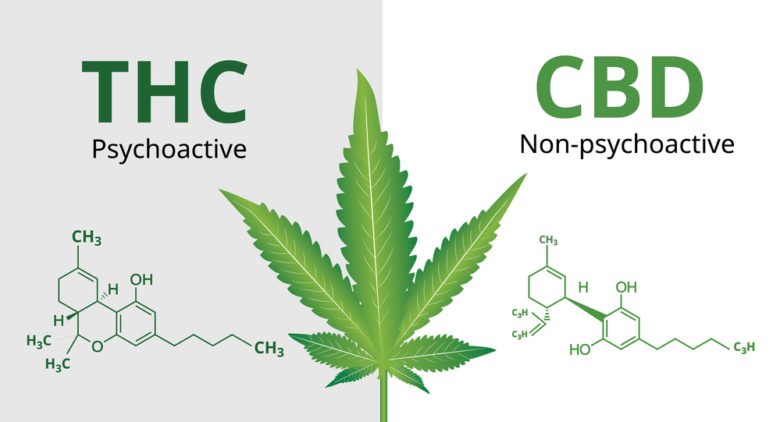CBD vs. THC, What’s the Difference?

Over the last ten years, a large number of states have legalized medical marijuana, recreational marijuana, or both. This action has drawn a lot of attention to cannabis products, though many have noticed a large variety of cannabis products, some claiming to do different things than others. Additionally, many questions have surfaced asking if all cannabis products will cause a person to experience a “high,” and if not, what is the difference?
This leads to questions regarding legality, purchasing, and commercial use of cannabis products, and can largely be solved by delineating the difference between CBD and THC.
So, let’s take a look at the difference between your edible CBD gummy, and your THC brownie, and understand the difference between these two productions of the cannabis plant.
Legality and Classification
Before we get into the difference between CBD and THC, we need to understand the Cannabaceae family. Cannabaceae is a family of plants that includes cannabis, marijuana, hemp, and other more specifically named organics such as Cannabis Sativa, Quebec Gold, or White Widow.
What we call hemp, is a family of Cannabis Sativa that contains less than 0.3 percent THC. Marijuana refers to Cannabis Sativa containing more than 0.3 percent THC, and is also used to refer to Cannabis Indica.
That’s a lot of information, and we’ll continue to touch on it, but now that we understand these basic biological classifications, let’s touch on legality.
On the Federal level, marijuana is an illegal substance. While a number of state laws change this, marijuana is federally illegal. However, in 2018, hemp products were federally removed from the marijuana classification. This is why you can enjoy anything from hemp milk to hemp-derived CBD, and can buy clothing made with hemp fabrics at your local stores.
Psychoactive
The primary difference between THC and CBD is that one is psychoactive and the other is not.
The human body contains a neuromodulatory system (meaning a system that effects and influences the nervous system) called the endocannabinoid system. This system has receptors for cannabinoids, of which both CBD and THC are classified.
When THC interacts with the endocannabinoid system, it causes a psychoactive response, as well as a general nervous (referring to nervous system, not fear) response. As we stated before, THC is also what delineates between hemp and marijuana. When a person takes THC, whether through smoking, an edible, or oil, they are utilizing the endocannabinoid system to trigger a psychoactive reaction that is more commonly referred to as “getting high.”
Neuroregulatory
While THC serves more of a psychoactive purpose in the endocannabinoid system, CBD can be more accurately described as neuroregulatory. First and foremost this means: CBD does not get you high.
CBD exists within your classic square/rectangle scenario. All marijuana contains CBD. Not all CBD products are marijuana. When CBD is derived from hemp, concentrated into oil, made into edible CBD, or even vaporized, the remaining product contains less than 0.3 percent THC. Because of this, people can ingest CBD products for their neuroregulatory effects without causing the psychoactive effects of THC.
These neuroregulatory effects—resultant of the endocannabinoid system—include a general feeling of calm, anxiety reduction, circadian rhythm regulation, insomnia treatment, and a number of others.
Because of the 2018 law regarding the classification of hemp, CBD products can be sold in natural grocers and convenience stores as legal substances.
Why Take CBD vs THC
The uses of THC are predominately recreational. While a number of people do utilize THC to assist with crippling anxiety, pain, and PTSD (medical marijuana), the most common use of THC products exists within the recreational field in states with legal recreational marijuana use.
CBD’s primary use is to assist with calmness, anxiety, and sleep. People are not purchasing CBD for the purpose of “getting high,” and typically ingest the substance through edible form or oil—it is not regularly smoked.
Thus, to answer the question of “why take CBD vs. THC,” it is in regards to your purpose. If you live in a state like Colorado and want to recreationally take THC, you do so in order to experience the specific endocannabinoid reaction it generates. If you are looking for a general relaxer, or need help going to sleep, take CBD.
Knowing the Difference
While there are some minor biological differences we didn’t touch on, you should now have a pretty good idea regarding the difference between CBD and THC—including in the legal department.
The main thing to remember is in regards to how they affect you, how they are treated on the federal level, vs the state level, their uses, and the plants they come from.
Now you can go to a store, or an online retailer and give CBD a try knowing that it won’t get you unexpectedly high, and that the person in your business meeting who puts CBD oil in their tea is not having a psychoactive experience at work.
